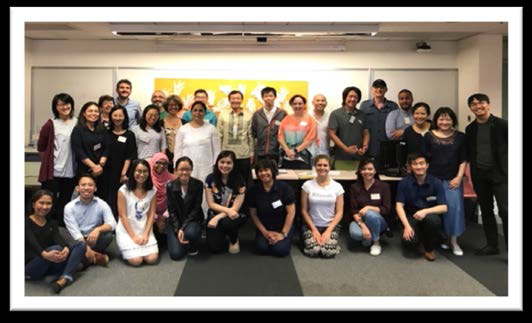AASP-IALSP Workshop on “Narratives of Identity: Bridging the Divides”
The Asian Association of Social Psychology (AASP) and the International Association of Language and Social Psychology (IALSP) have a long-standing Memorandum of Understanding to exchange symposia at one another’s conferences. Links between leading scholars in the two organizations have deepened to the extent where “Narratives of Identity: Bridging the Divides – an AASP/IALSP Task Force” could be agreed upon as a theme to join the two associations together in a shared research endeavour. Funding was obtained from AASP for a Small Group Meeting July 7-9, 2019 at Hong Kong Polytechnic University to build collaborative research and mentor early career researchers bridging the two organizations. Funding from AASP was complemented by an IALSP Task Force proposal and support from Hong Kong Polytechnic University (thanks especially to Ivy Wu, who ably administered the workshop hosted by Professor Bernadette Watson).
Theater professionals Harriet Chung and Henry Chan facilitated an ice-breaker to start the meetings that helped everyone get to know one another through fun group activities. Here they are below preparing materials for their ice-breaking activities.
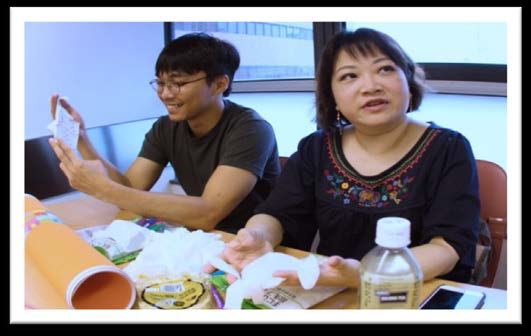
Twenty-two, mostly early career academics from Asia, Australasia, and the United States were put into 3 research streams.
Stream One focused on “Bridging the divide in healthcare” and was led by IALSP President Liz Jones and Professor Bernadette Watson, Director of a newly established International Research Centre for the Advancement of Health Communication at Hong Kong Polytechnic University. The thrust of stream Two was, “Bridging the divide in intergroup relations” led by Professor James Liu, a Past-President of AASP, and Dr. Sammyh Khan. While Stream Three deliberated on, “Bridging the divide in personal well-being across cultures” led by Professor Michael Harris Bond and Dr. Vivian Lun.
Stream One, on health communications, brought together scholars from Australia, Hong Kong, Philippines, India, and the US, who worked on developing 2 programs of research with mentors Liz Jones and Bernadette Watson. The first is examining how culture influences patient preferences for decision-making and how their health provider communicates. The second program is examining the social construction of health-related stigma. The research teams will be presenting results from their initial studies at ICLASP in Hong Kong next year.
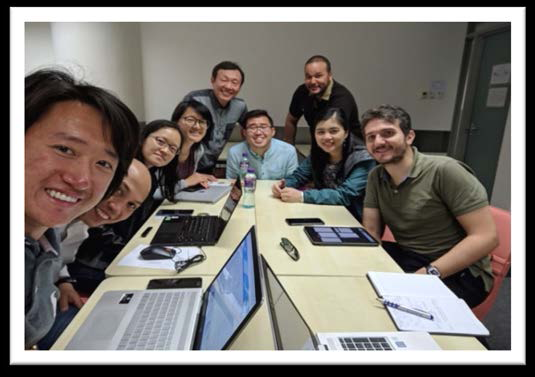
Stream Two, on intergroup relations and collective remembering, brought together early career researchers from the US, Hong Kong, China (via Italy), the Philippines, and Indonesia. This group was provided with an introductory lecture by James Liu on living historical memory and its possible role in identity politics, and then set free to work on data from a 42 society, cross-cultural dataset centered around the open-ended question: “Please name 3 historic events that have occurred during the lifetime of people you know (or have known) that have had the greatest impact on your country (room for 3 open-ended answers)”.
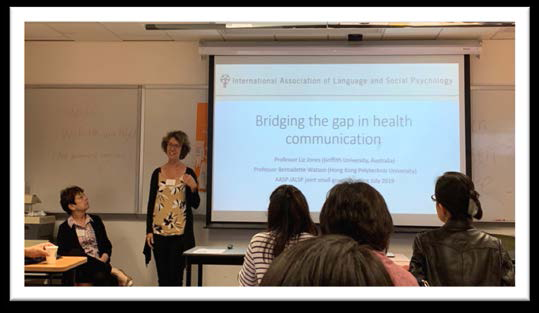 Stream participants worked incredibly well and efficiently together. Four concrete research projects emerged from discussion. One was a data-intensive analysis of the relationship between the affective evaluation of collective remembering across cultures, and the others were culture-specific analyses of collective remembering in specific societies where the workshop participants had expertise: the Philippines, Indonesia, Hong Kong, China, and Taiwan. Three of these projects will likely be developed into journal articles that can be published in a Special Issue of the Asian Journal of Social Psychology on Living Historical Memory, while the fourth is likely to be a stand-alone publication. It is also anticipated that some of these research projects will be presented at the IALSP’s conference at HK Polytechnic University in 2020. Below is Stream 2 in action.
Stream participants worked incredibly well and efficiently together. Four concrete research projects emerged from discussion. One was a data-intensive analysis of the relationship between the affective evaluation of collective remembering across cultures, and the others were culture-specific analyses of collective remembering in specific societies where the workshop participants had expertise: the Philippines, Indonesia, Hong Kong, China, and Taiwan. Three of these projects will likely be developed into journal articles that can be published in a Special Issue of the Asian Journal of Social Psychology on Living Historical Memory, while the fourth is likely to be a stand-alone publication. It is also anticipated that some of these research projects will be presented at the IALSP’s conference at HK Polytechnic University in 2020. Below is Stream 2 in action.
Stream Three’s Vivian Miu-Chi Lun and Michael Harris Bond contributed their expertise to the whole workshop by providing an orienting lecture on the emerging importance of working with and making psychological sense from multi-cultural data sets. James Liu had granted workshop participants access to a large, previously collected, but only partially analyzed data set. So, 8 workshop participants volunteered to participate in our Stream 2 meetings over the next two days and dive into this data base to develop a multi-cultural model using the constructs in the Liu data set, focusing on subjective well-being as a common outcome of interest.
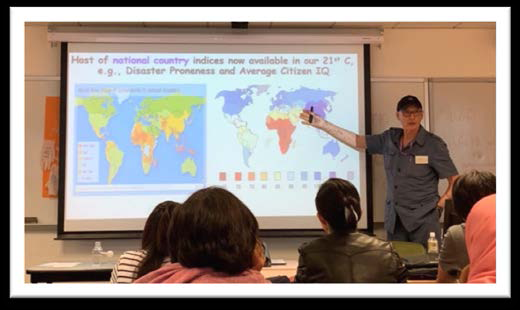
Vivian and Michael provided continuous guidance over this period, working together and separately with the 3 teams formed by our 8 participants. Each team selected its own constructs and measures, put them together in persuasive ways, with a view to analyzing the multi-cultural data set and show how national culture might moderate the linkages among the model effects their selected constructs and their associated measures. Our shared goal was to produce publishable research. Vivian and Michael have since been in contact with our 3 teams and are prepared to assist them further towards this goal. We await developments with keen interest. Below is one of our teams working intently with Vivian to develop its proposal.
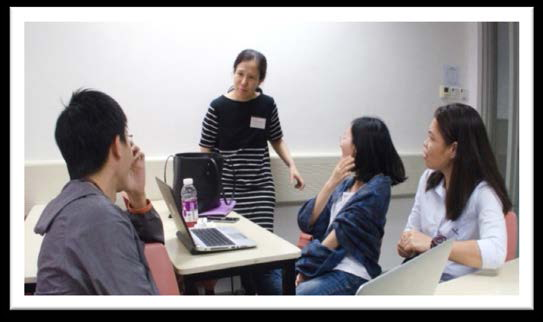
On the last day of the workshop, all sub-groups of the workshop and their teams presented their proposed projects to all workshop attendees as their during-workshop deliverable. There was an articulated understanding that workshop teams would continue working on their projects with their workshop leaders to prepare presentations for the next IALSP conference in Hong Kong, June, 2020. We hope so.

